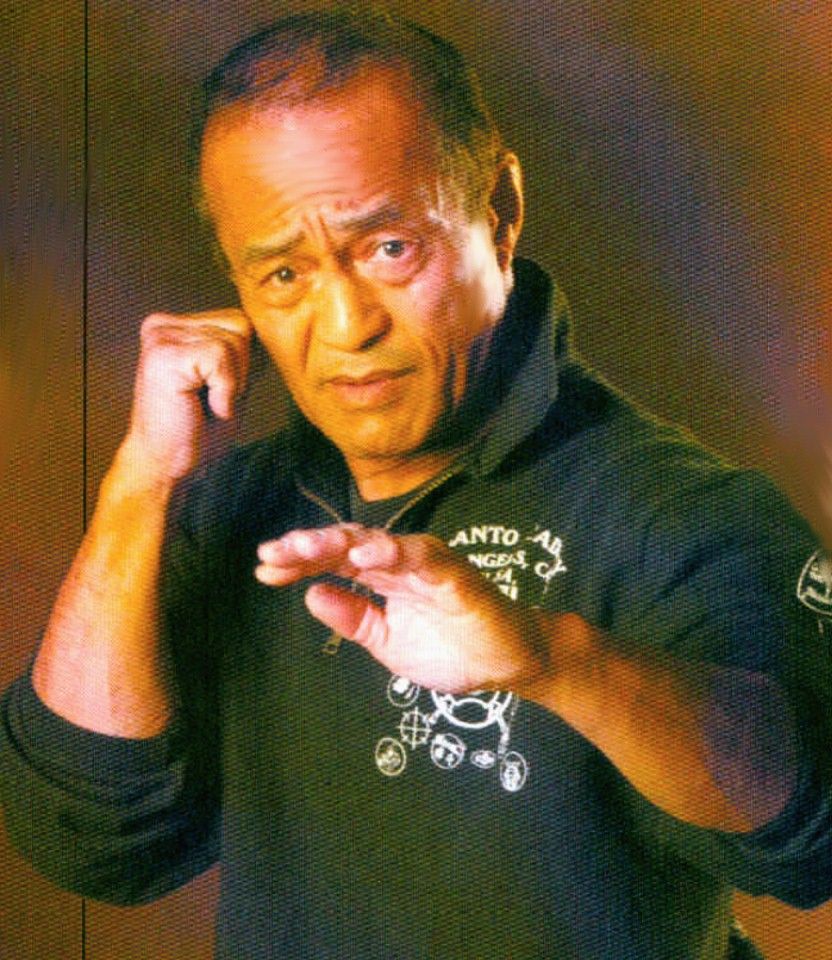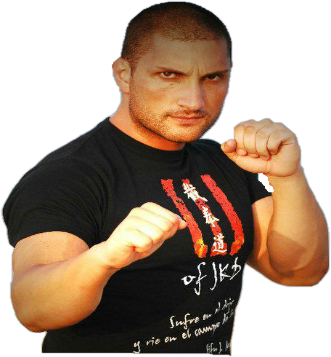Wong Fei-hung (9 July 1847 — 25 March 1924) was a Chinese martial artist, physician, acupuncturist, and revolutionary, who became a folk hero and the subject of numerous films and television series. He is considered an expert in the Hung Gar style of Chinese martial arts. As one of the best known Hung Gar practitioners in modern times, Wong and his martial arts lineage have received a lot of attention. As a physician, Wong practised and taught acupuncture and other forms of traditional Chinese medicine in Po-chi-lam, his private clinic in Foshan, Guangdong. A museum dedicated to him was built in Foshan. Wong's most famous students included : Wong Hon-hei (his son), Lam Sai-wing, Leung Foon, Dang Fong, Wong Sai-wing and Ling Wan-kai. In folk tales, Wong is often associated with the Ten Tigers of Canton.
Life
Wong was born on Mount Xiqiao, Foshan, Guangdong in the reign of the Daoguang Emperor in the late Qing Dynasty. At the age of five, he started learning Hung Gar from his father, Wong Kei-ying. When he was 13, he learnt the essentials of the Iron Wire Fist and sling from Lam Fuk-sing, a student of "Iron Bridge Three" Leung Kwan, after meeting Lam in Douzhixiang during a martial arts street performance. He learnt the Shadowless Kick from Sung Fai-tong later.
In 1863 at the age of 17, Wong set up his first martial arts school in Shuijiao. 26 years later, in 1886, he opened his Po-chi-lam clinic at Ren'an. In 1919, Wong was invited to perform at the Chin Woo Athletic Association's Guangzhou branch during its opening ceremony.
Wong died of illness on May 24, 1924 in Chengxi Fangbian Hospital in Guangdong. He was buried at the foot of Baiyun Mountain. Wong's wife, Mok Kwai-lan, and his two sons, along with his students Lam Sai-wing and Dang Sai-king, later moved to Hong Kong and established martial arts schools there.
In legend, Wong was recruited by Liu Yongfu, a commander of the Black Flag Army, to be the army's medical officer and martial arts instructor. Wong also instructed Guangdong's local militia in martial arts and once followed the Black Flag Army to fight the Imperial Japanese Army during the Japanese invasion of Taiwan in 1895.
Description
- Traditional Chinese : 黃飛鴻
- Simplified Chinese : 黄飞鸿
- Born : 9 July 1847 Foshan, Guangdong, China
- Died : 25 March 1924 (aged 76), Guangzhou, Guangdong, China
- Residence : Foshan, Guangdong, China Guangzhou, Guangdong, China
- Style : Chinese martial arts, Hung Gar
- Teacher(s) : Wong Kei-ying
- Rank : Grandmaster
- Occupation : Martial artist, physician, revolutionary
- Spouse :
- Ms. Luo (m. 1871)
- Ms. Ma (m. 1896)
- Ms. Chen (m. 1902)
- Mok Kwai-lan (m. 1915)
- Notable students :
- Leung Foon
- Lam Sai-wing
- Dang Fong
- Ling Wan-kai
Wong married four times in his life. The personal names of his first three wives are unknown. He had four known children — two sons and two daughters.
Spouses
- Wong's first wife was surnamed "Lo" or "Law". She married Wong in 1871 and died of illness three months after their marriage.
- Wong's second wife was surnamed "Ma". She married Wong in 1896 and died of illness. She bore Wong two daughters.
- Wong's third wife was surnamed "Sam" or "Sum". She married Wong in 1902 and died of illness. She bore Wong two sons.
- Wong's fourth wife, Mok Kwai-lan, married Wong in 1915. She died in Hong Kong on 11 March 1982.
- Wong Hon-syu, born to Wong's third wife.
- Wong Hon-hei, also born to Wong's third wife.
- Wong Hon-lam, born to Wong's second wife.
- Wong Hon-sam, also born to Wong's second wife.
Wong was a master of Hung Gar (also called Hung Fist). He systematised the predominant style of Hung Gar and choreographed its version of the Tiger Crane Paired Form Fist, which incorporates his Ten Special Fist techniques. Wong is famous for using the Shadowless Kick. He named the techniques of his skills when he performed them.
Wong was adept at using weapons, such as the staff and southern tiger fork. One tale recounts how Wong defeated a group of 30 gangsters on the docks of Guangdong with a staff. Wong is sometimes incorrectly identified as one of the "Ten Tigers of Canton". His father Wong Kei-ying was one of the ten but he was not. Wong is also sometimes referred to as the "Tiger after the Ten Tigers".
Cultural references / Film and television
A series of 89 movies on Wong Fei-hung was produced since 1949 in Hong Kong. Kwan Tak-hing starred as Wong and earned himself the nickname "Master Wong" for his role. Other prominent actors who played Wong Fei-hung include: Jet Li in the Once Upon a Time in China film series; Vincent Zhao in the television series Wong Fei Hung Series.
List of notable Wong Fei-hung films:
- Challenge of the Masters (1976), starring Gordon Liu.
- Drunken Master (1978), starring Jackie Chan. Yuen Siu-tien played Beggar So.
- Magnificent Butcher (1979), starring Kwan Tak-hing. Sammo Hung, Yuen Biao and Wei Pak co-starred as Wong's students Wing, Foon and Chik.
- Martial Club (1981), starring Gordon Liu.
- Once Upon a Time in China (1991), starring Jet Li. This is the first part of a series of six films on Wong Fei-hung. Vincent Zhao took over the role of Wong Fei-hung from Jet Li in two of the movies.
- Great Hero From China (1992), starring Chin Kar-lok.
- Iron Monkey (1993), starring Donnie Yen as Wong Kei-ying. Angie Tsang played a young Wong Fei-hung.
- Last Hero in China (1993), starring Jet Li.
- Drunken Master II (1994), starring Jackie Chan. Ti Lung co-starred as Wong Kei-ying.
- Drunken Master Killer (1994), starring Willie Chi.
- Around the World in 80 Days (2004), Sammo Hung appears briefly as Wong Fei-hung.
- Wong Fei Hung Series (1996) is a Hong Kong television series on five stories about Wong Fei-hung. The series was produced by Tsui Hark and starred Vincent Zhao as Wong Fei-hung. This television series is sometimes regarded as a television counterpart to the Once Upon a Time in China films.
- Shaonian Huang Feihong (2002) is a Chinese television series featuring Wong Fei-hung as a youth.
- My Master is Wong Fei-hung (2004), a Hong Kong comedy television series.
- Grace Under Fire (2011), a Hong Kong television series about Wong Fei-hung's wife Mok Kwai-lan.
The Chinese folk song On the General's Orders has become popularly associated with Wong Fei-hung because it was used as the theme song in various movies about Wong (especially those starring Kwan Tak-hing).
The song was used in the opening of the 1978 film Drunken Master, starring Jackie Chan. In the Once Upon a Time in China film series, the song was titled A Man Should Better Himself and Wong Jim provided the lyrics. The song was performed by George Lam and Jackie Chan (in the second movie).
A rearranged version was rewritten and performed by Dayo Wong as the theme song of Men Don't Cry. The Taiwanese singer Kenji Wu performed a song titled On the General's Orders but the tune is different from the original one.
Others
- The character of Lee Rekka in SNK's Last Blade series is based on Jet Li's character of Wong Fei-hung in the Once Upon a Time in China film series.
- Fei Fong Wong, the lead character in the Square video game Xenogears, was named after Wong Fei-hung (his name being written the same in katakana as Wong's name is written). Another protagonist, Citan Uzuki, closely resembles Wong, being both a physician and martial artist dressed in traditional Chinese garments.
- In Will Thomas' third mystery novel, The Limehouse Text, his Victorian detective Cyrus Barker trained in martial arts in Guangdong under Wong Fei-hung's tutelage.
- Stan Sakai has mentioned his plans to include a character based Wong Fei-hung in a future issue of his comic book Usagi Yojimbo.
- Wong Fei Hong is a character in the collectible card game Shadowfist.








